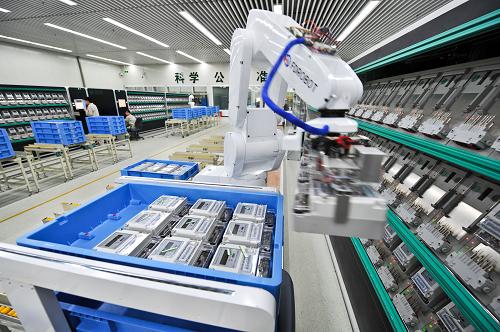Manufacturing hub starts work on first zero-labor factory
"The 'zero-labor factory' does not mean we will not employ any humans, but what it means is that we will scale down the size of workers by up to 90 percent," said Chen Qixing, the company's board chairman.
After the work on smart factory started, Chen predicted that instead of 2,000 workers, the current strength of the workforce, the company will require only 200 to operate software system and backstage management....
Faced with the dire situation of a shrinking [due to aging and the one child policy] workforce, economists suggest that China should upgrade its technology and largely use smart robots.
My bet is that China is going to realize that this enables increase leisure along with increased distributed prosperity and the beginning of the fulfillment of the socialistic ideal of the liberation of workers.

2 comments:
Okay, it's starting to really take off now. How is the wealth (welfare) of all this humanless output going to be distributed? Or will it? Do only a handful of people participate in both the real and financial wealth with the rest of us operating under massive, mind-blowing inequality and authoritarian police/prison conditions to keep us from going crazy or, will some sort of utopian scenario develop? (Obviously, on the latter, NOT.) So how bad will things get?
I think that the Chines will distributed it but that is anti-capitalistic so the West will have to be prodded into it.
The Western TPTB will eventually figure out that demand counts and that means consumers have to have purchasing power if a market-driven monetary production economy is to continue.
But what the conditions for future distribution will be under socialism or capitalism are unclear. Socialist states will have a smoother path to it since the cultural conditioning is there, while it is the opposite in capitalist societies based on competition.
What it does is reveal that the issue is distribution.
Capitalism and socialism have very different distributional systems, on based on the ability to pay and the other on need.
Post a Comment